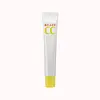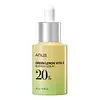What's inside
What's inside
 Key Ingredients
Key Ingredients

 Benefits
Benefits

 Concerns
Concerns

 Ingredients Side-by-side
Ingredients Side-by-side

Citrus Limon Fruit Extract
MaskingAscorbic Acid
AntioxidantPropanediol
SolventButylene Glycol
HumectantDipropylene Glycol
HumectantCyclopentasiloxane
Emollient1,2-Hexanediol
Skin ConditioningCyclohexasiloxane
EmollientSodium Hydroxide
BufferingC12-14 Alketh-12
EmulsifyingBisabolol
MaskingSodium Polyacryloyldimethyl Taurate
Emulsion StabilisingWater
Skin ConditioningPolyacrylate Crosspolymer-6
Emulsion StabilisingDimethicone/Vinyl Dimethicone Crosspolymer
Skin ConditioningXanthan Gum
EmulsifyingEthylhexylglycerin
Skin ConditioningAllantoin
Skin ConditioningGlycerin
HumectantGlutathione
Citrus Aurantium Dulcis Flower Oil
AstringentLitsea Cubeba Fruit Oil
MaskingAdenosine
Skin ConditioningCitrus Paradisi Peel Oil
MaskingDisodium EDTA
Citrus Aurantium Bergamia Fruit Oil
MaskingMentha Viridis Leaf Oil
AstringentTocopherol
AntioxidantFerulic Acid
AntimicrobialBarosma Betulina Leaf Extract
PerfumingN-Butyl Alcohol
PerfumingHydrogenated Lecithin
EmulsifyingPolyglyceryl-10 Stearate
Skin ConditioningSorbitol
HumectantPanthenol
Skin ConditioningBeta-Glucan
Skin ConditioningSodium Hyaluronate
HumectantSodium Ascorbyl Phosphate
AntioxidantCaprylic/Capric Triglyceride
MaskingHelianthus Annuus Seed Oil
EmollientHyaluronic Acid
HumectantSucrose Stearate
EmollientGlyceryl Stearates
EmollientBeta-Carotene
Skin ConditioningSodium Hyaluronate Crosspolymer
HumectantNiacinamide
SmoothingHydrolyzed Sodium Hyaluronate
Skin ConditioningHydrolyzed Hyaluronic Acid
HumectantThioctic Acid
AntioxidantLycopodium Clavatum Extract
Skin ConditioningEquisetum Arvense Extract
AstringentSodium Acetylated Hyaluronate
HumectantPyridoxine
Skin ConditioningHydroxypropyltrimonium Hyaluronate
Folic Acid
Skin ConditioningBiotin
AntiseborrhoeicCeramide NP
Skin ConditioningUbiquinone
AntioxidantCyanocobalamin
Skin ConditioningThiamine Hcl
MaskingRiboflavin
Cosmetic ColorantLinoleic Acid
CleansingHesperidin
EmollientErgothioneine
AntioxidantLimonene
PerfumingLinalool
PerfumingCitral
PerfumingCitrus Limon Fruit Extract, Ascorbic Acid, Propanediol, Butylene Glycol, Dipropylene Glycol, Cyclopentasiloxane, 1,2-Hexanediol, Cyclohexasiloxane, Sodium Hydroxide, C12-14 Alketh-12, Bisabolol, Sodium Polyacryloyldimethyl Taurate, Water, Polyacrylate Crosspolymer-6, Dimethicone/Vinyl Dimethicone Crosspolymer, Xanthan Gum, Ethylhexylglycerin, Allantoin, Glycerin, Glutathione, Citrus Aurantium Dulcis Flower Oil, Litsea Cubeba Fruit Oil, Adenosine, Citrus Paradisi Peel Oil, Disodium EDTA, Citrus Aurantium Bergamia Fruit Oil, Mentha Viridis Leaf Oil, Tocopherol, Ferulic Acid, Barosma Betulina Leaf Extract, N-Butyl Alcohol, Hydrogenated Lecithin, Polyglyceryl-10 Stearate, Sorbitol, Panthenol, Beta-Glucan, Sodium Hyaluronate, Sodium Ascorbyl Phosphate, Caprylic/Capric Triglyceride, Helianthus Annuus Seed Oil, Hyaluronic Acid, Sucrose Stearate, Glyceryl Stearates, Beta-Carotene, Sodium Hyaluronate Crosspolymer, Niacinamide, Hydrolyzed Sodium Hyaluronate, Hydrolyzed Hyaluronic Acid, Thioctic Acid, Lycopodium Clavatum Extract, Equisetum Arvense Extract, Sodium Acetylated Hyaluronate, Pyridoxine, Hydroxypropyltrimonium Hyaluronate, Folic Acid, Biotin, Ceramide NP, Ubiquinone, Cyanocobalamin, Thiamine Hcl, Riboflavin, Linoleic Acid, Hesperidin, Ergothioneine, Limonene, Linalool, Citral
 Reviews
Reviews

Ingredients Explained
These ingredients are found in both products.
Ingredients higher up in an ingredient list are typically present in a larger amount.
Ascorbic Acid is is pure Vitamin C. This form makes up the largest amount of vitamin C found naturally in our skin.
Not only is vitamin C great for your overall health and immune system, it also has plenty of benefits on your skin.
Vitamin C is best used for brightening skin. It improves dark spots, acne scars, and hyperpigmentation. This is because it blocks the process of skin darkening when exposed to UV.
Remember: Vitamin C should not replace sunscreen!
Your skin uses vitamin C to build collagen. Collagen is one key component in having a strong skin barrier and plump skin. Vitamin C also plays a role in regulating collagen, thus making it effective in improving wrinkles and fine lines.
Ascorbic acid shows potent antioxidant activity. As an antioxidant, it helps fight free-radicals. Free-radicals are molecules that may damage your skin cells. These antioxidants also protect skin against UV damage.
The best formulations include Vitamin E and/or ferulic acid. These two ingredients help stabilize and provide a boost in the benefits of ascorbic acid. This is because ascorbic acid becomes unstable when exposed to UV and air. In fact, you can tell your ascorbic acid has oxidized when it turns an orange-yellow color.
Ascorbic acid is generally compatible with other ingredients. However, using ascorbic acid with other active ingredients might cause irritation. Two ingredients: copper ions and benzoyl peroxide, will inactivate ascorbic acid completely.
Read more about other types of Vitamin C:
Foods rich with vitamin C include oranges, strawberries, broccoli, bell peppers, and more. When consuming Vitamin C, your skin receives a portion of the nutrients.
Learn more about Ascorbic AcidButylene Glycol (or BG) is used within cosmetic products for a few different reasons:
Overall, Butylene Glycol is a safe and well-rounded ingredient that works well with other ingredients.
Though this ingredient works well with most skin types, some people with sensitive skin may experience a reaction such as allergic rashes, closed comedones, or itchiness.
Learn more about Butylene Glycol